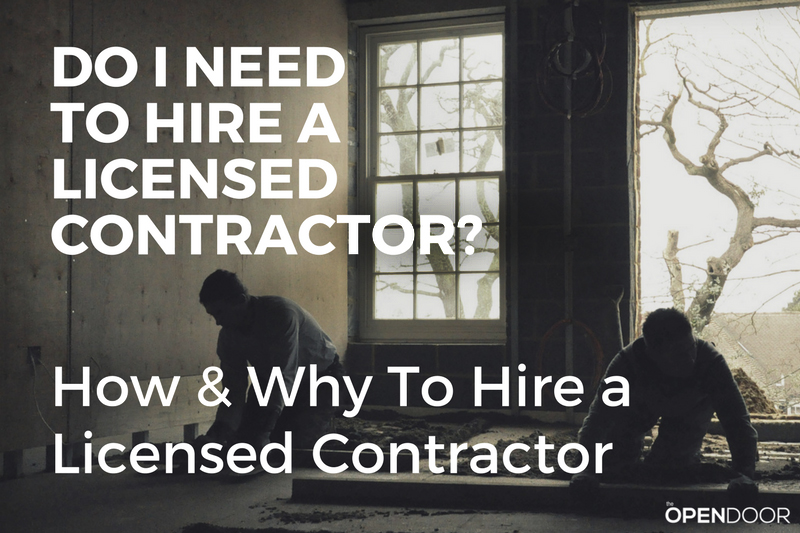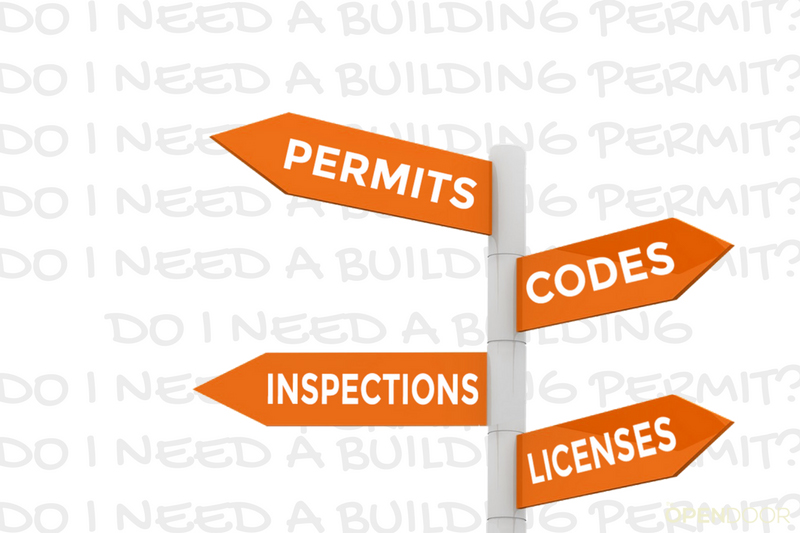Selecting and hiring a contractor for your home construction project is a tough decision. Like your architect/designer, your contractor becomes a crucial member of your project team and is important to the success (or failure) of your project.
Understanding your contractor’s reliability, competency, and skills is an important step to choosing the right contractor for your job.
What is a licensed contractor? Why should I hire a licensed contractor? And how do I know if my contractor is licensed?
Let’s examine these questions and dig into the nuances of hiring a licensed contractor for your home construction project.
What is a Licensed Contractor?
A licensed (or certified) contractor has the know-how, applied background, and training necessary to get a general contractors license. Licensing involves taking and passing exams and meeting certain criteria to prove reasonable competency in a trade. A licensed contractor has worker’s compensation and liability insurance for his or her employees and can get and also sign building permits.
If you’re building a new home, renovating, or adding to your existing home, make sure you understand the licensing requirements for your state before hiring your contractor. Before signing any contract, check with your local contractor’s licensing board. The board should tell you whether the contractor’s license is valid, whether a bond is in place, and whether there have been any claims filed against the contractor that you should know about.
What is the Difference Between a Licensed Contractor and a Registered Contractor?
Some states require contractors to be licensed while others require just registration. The difference is this:
Licensing involves taking and passing exams and meeting certain criteria to prove reasonable competency in a trade in their respective state.
Registration is a written application filed with the government that allows you to perform work in that state or city. It doesn’t guarantee expertise or competency, it just says that the person or entity registering can legally perform work in that jurisdiction.
The Importance of Hiring a Licensed Contractor
While you may know that choosing a licensed and insured contractor is important, you may be unsure as to why this is important.
In general, licensing, insurance and bonding protect you and your rights as a customer of that contractor. Proper licensing for a contractor indicates that they have undergone adequate training and have the experience to completely fill their professional role. A licensed contractor has fulfilled the criteria to obtain professional insurance to work in their field, and licensing can also indicate that a contractor has paid a bond covering their work.
Most states require that contractors secure a bond in their name in order to obtain a license. A bond is a large sum of money, held in a non-interest bearing account in case the contractor should make a mistake that warrants a large amount of liability. Most bonds are obtained through insurance companies and the contractor makes a regular payment to maintain their bond. This bond can be accessed by you to cover costs for damage if the contractor leaves without finishing the job properly. This offers an extra level of insurance for bonded contractors.
Insurance is obtained by contractors to cover all the work they perform while on your property. This means that even if an accident does happen, you and your contractor will be covered.
When Is a Contractor’s License Required?
Licensing laws vary by state, so check requirements with your jurisdiction and verify contractor licensing before hiring.
In general, licenses are needed for the following: commercial work, residential work requiring a building permit, plumbing, electrical, HVAC, gas, and asbestos/hazardous waste remediation. Some states have dollar amounts for determining which jobs a license is required for.
Some residential work may not require a licensed contractor. In these cases, what kind of contractor should you use?
Besides the potential of ending up with shoddy work, painfully long projects, increased costs from the original quote, and inferior materials, homeowners hiring unlicensed contractors open themselves up to incredible risk, liability and financial headaches, including the following:
- Should a problem arise, you may not have any recourse, as a contract with an unlicensed contractor may not be legally enforceable.
- You assume financial responsibility should the project become problematic.
- You assume liability should a worker be injured on their property.
- You assume liability should the project not meet code.
- You assume liability should the contractor cause future damage to your home.
- You assume liability for payment to sub-contractors and is subject to liens.
In most cases, an unlicensed contractor will be cheaper. But you need to weigh the pros and cons and decide whether to hire a licensed or unlicensed contractor even if one is not required.
How to Verify If a Contractor is Licensed
Before hiring a contractor, ask to see their contractor’s license. Then verify their license with the city and/or state government yourself. Remember a business license is not the same as a contractor’s license.
In most states, you can confirm contractor licenses on state government websites. Most states have licensing boards that approve and track contractors, builders, and sub-contractors. They also issue licenses to contractors in the area, typically upon passing certain state requirements. These boards typically have websites that post contractors by their name and company name. You may also be able to view things such as how long the contractor has been licensed in the state, whether they have any complaints filed against them, or whether they have a bond and insurance. If your state does not have a website with this information, look up the number for the department on your state’s website and call the office. The information is always free and open to the public and you can typically get an answer that same day.
If the contractor you are considering is licensed, then you know that you are protected and are working with a good contractor. If he or she is not licensed, then ask yourself if opting for the lowest quote is really worth the risk.
Here’s some helpful resources to check licenses and licensing requirements for your state:
- Home Advisor’s Contractor Licensing Requirements by State.
- Angie’s List License Check – A useful tool to look up active license requirements for professionals in each state. Where available, it also provides links to regulatory agencies real-time license verification websites.
Tips for Hiring a Well-Qualified Contractor
The 6-step process in selecting a well-qualified contractor is covered in this article: How to Find the Right Contractor For Your Home Project.
In addition to those helpful tips, here are some reminders:
- Get cost estimates for more than one contractor.
- Hire only licensed contractors. Check with your local licensing board to confirm licensure of your potential contractor. Don’t just rely on the contractor to provide proof of licensure as it may be forged.
- Get a written contract.
- Ask for proof of insurance.
- Make sure the contractor obtains a building permit for work requiring a permit.
- Never pay in cash. (Also, there is usually a limit to how much money a contractor can request for down payment at the beginning of a project.)










